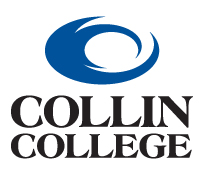Hi (Again) Folks:
Welcome to Introduction to Sociology. Please plan on spending the next half-hour or so reading through this orientation to the class. If, after reading through all of the materials, you still have questions, I will of course be happy to assist you in any way that I can.
My name is Larry Stern and I am your instructor for this course: Sociology 1301 – Introduction to Sociology. I am a Professor of Sociology and have been teaching at Collin for the past twenty-nine (!) years. My office is located in the Library at Collin’s Spring Creek Campus on the second floor in room L207. Please come by to say hello if you are ever on campus. Since my "in-office" times will vary during the semester, it would be best to make an appointment. During this semester my "official" on-line office hours are on Mondays through Thursdays from 10AM until 12:00PM but, of course, I can make myself available if you'd like to set up an appointment for another time.
For those of you that will not be on campus – this is, after all, a distance-learning course – the best way to reach me is by email at lstern@collin.edu. If you would prefer to call, I can also be reached at 972-881-5608 and will be checking my voicemail on a daily basis. Also - and this is important - new federal guidelines have been put into place that must be followed to "certify" your participation in this course. Previously, all you had to do was log on to the class on Canvas - the portal we will be using - within the first week. Now, to be certified you must take a more active role - you must complete at least one assignment. This should not pose a problem since, as you shall see from examining the course calendar, you are all required to introduce yourself to the class, read a brief article, and tell us "why you might already be a sociologist" by Tuesday, June 5th, no later than 11:59PM.You will post this in Canvas in the "Discussions" section that is listed in the left hand column of the course page. So please make certain that you complete this assignment to avoid all sorts of bureacratic problems! (I will come back to the course calendar again, in a moment.)
If interested, you can find out more about me (or my multiple selves) by clicking on "About Me." As you can see from the photo above, I'm a Yankee - born, raised and educated in New York - and a "damn Yankee," at that! And yes, these life experiences have molded and shaped me into the person I am today - just as your experiences have done the same for you. This is, in fact, one of the major propositions of sociology, as I hope you shall see. For the moment, however, I simply want to give you a hearty "welcome" and tell you a bit about the course.
So . . . hi folks, welcome to Introduction to Sociology!

Perhaps this cartoon overstates the point a bit, but actually, I don't think by much. I am certainly not the first to argue that a careful and systematic analysis of what's going on in the world might be helpful in dealing with the various social problems that crop up on a fairly regular basis. The problem, of course, most eloquently stated by Josh Billing, the pen name of humorist Henry Wheeler Shaw (1818 - 1885), is that:

(Photo found at http://www.britannica.com/blogs/2010/1/a-litry-anniversry-josh-billings/)
"It ain't ignorance that does the most damage, it's knowing so derned much that ain't so!"
Listening to what the various political pundits or "talking heads" on cable TV - on each extreme - are saying (or shouting at each other) surely bears witness to Billing's comment of 150 years ago.
But let's not despair. My goal this semester is to convince you that understanding and applying a sociological perspective will deepen your understanding of the world(s) you inhabit, be they private and local or public and operating on a broader societal and cultural plane. You will hopefully see that social forces will have a determinable affect on the probability or likelihood that you will choose to act or behave one way rather than another, embrace certain beliefs, values, attitudes, and ideas rather than others, and be successful in reaching your intended goals in life.
And, yes, you will see that life is incredibly complicated and messy. H. L. Mencken (1880 - 1956), a noted journalist, editor and critic, had it right when he said:

(Photo found at http://welcometobaltimorehon.com/people/cartoon-map-of-baltimore/people/hl-mencken)
"For every major problem in this nation, there is a simple solution - and it is wrong."
And, yes, you should also know that after studying both history and the present shenanigans of human beings over the past forty years I can tell you that I’m not particularly impressed. Sure, we humans are capable of kindness, understanding, compassion, and love and even act that way under specifiable circumstances. But there is still too much hate, finger-pointing, prejudice, discrimination, inequality, human rights violations and above all else, ignorance. This is not as pessimistic as it sounds. Ignorance can be overcome, and faulty beliefs can be altered. And I am convinced that understanding and applying a sociological perspective will aid you in making sense out of it all. I take great comfort from this quote from Oliver Wendell Holmes, American Author & Physician, 1809 – 1894:

(Photo found at http://www.superstock.com/search/Wendell)
"Man's mind stretched to a new idea never goes back to its original dimensions."
What it all comes down to is this. Sociology is not simply knowing so-called “facts and figures” about society – how many homeless people there are, how many crimes are committed, how many divorces occur in a given year, how many people lack decent health care, and so on. Although sociologists are certainly attentive to these statistics, sociology is less an assemblage of facts and figures and more a “way of seeing” and thinking about these things; a way of focusing on certain aspects of human conduct, raising certain questions and then relying on the systematic application of scientific methods – not individual, personalized, impressionistic accounts – to attain a deeper understanding of the world.
And it is quite likely that the application of the sociological perspectives and concepts you will encounter will lead you to “see” the world and your immediate surroundings differently and to “notice” things that have thus far escaped your attention. Do not, however, jump to the conclusion that sociology is necessarily “subversive.” True, the application of a sociological perspective to something that you think you “already know and understand” might challenge your position and force you to reconcile the differences. But a sociological analysis might just as well lend added support to your previous understanding and, in fact, strengthen it considerably. This is, of course, for you to decide.
The "Nuts and Bolts" of the Course
So, what are the "nuts and bolts" of the course? Before going into details, let me immediately answer two questions that often pop up. How is this course different from an on-site class? Is this course more work and difficult than taking introduction to sociology in the classroom? Although the experience of taking an online course is qualitatively different from taking an on-site class, I do not believe that an online course is inherently more difficult. One difference, of course, is that students do not attend class - during the summer session for two hiurs each day, four days a week - hearing lectures and participating in class discussions. In my on-site classes, we go well beyond the textbook - which is nevertheless required reading - and discuss (and argue about) various timely social issues. To compensate for this, I have added additional readings that are designed to have you spend those two hours each day on Monday through Thursday reading and thinking about these issues - and participating in online discussions should you choose to do so. Although, as you shall see below, taking part in these online discussions is not mandatory - no specified percentage of your grade depends upon it - bonus points will be awarded if you do choose to participate. At the same time, you can expect questions drawn from these readings - along with those from the textbook - to appear on the weekly quizzes.
As mentioned before, we will be using Canvas as our web portal for the course. For those of you that are not familiar with it, Canvas is basically an online environment – a password protected safe place – which allows us to interact with each other. For the most part, you will be using Canvas for four things: (1) taking quizzes, (2) submitting required writing assignments, (3) participating in discussions (more later), and (4) monitoring your grade. For the most part, however, all of the relevant information - this welcome letter and class orientation, the course syllabus, the course calendar with links to the readings, writing assignments and discussion topics as well as a list of all due dates, a Frequently Asked Questions page, and information (should you be the least bit curious) about me - can be retrieved from my web page.

(Cartoon found at http://nyceducator.com/2013_08_01_archive.html)
Syllabus
The syllabus for this class lists the textbook information and outlines all of the requirements for the course. You can see the syllabus by clicking the link in the preceding sentence OR, as you will no doubt do as the course proceeds, by clicking the box titled "Syllabus" on the course window that brought you to this page. Please take a few minutes to read through it.
Quizzes
As you will see from reading the syllabus, you will be required to complete ten out of fourteen multiple choice/true-false quizzes that cover definitions of basic sociological concepts and theories as well as the substantive content of the readings. These quizzes - each consisting of 10 questions - will be posted and taken on Canvas - you will find links for them under the heading "Quizzes" located in the left-hand column of the course page (and also, since Canvas is redundant, listed under the heading "Assignments," also found in the left-hand column). Each quiz will correspond to a specific course unit and will be available online, opening at 7AM the Monday morning that the materials are assigned, and typically closing that night at 11:59PM. If we spend more than one day on a particular unit, the due date for the quiz will at 11:59PM on the day we finish that unit (check the course calendar for the precise dates).The purpose here is to keep you involved in the course on a daily basis - just as if you were taking the course on-site and we met Monday through Thursday each week. You will have one hour to complete each quiz - which is more than enough time - and it is quite possible that you will have all of the relevant information "nearby" as you answer the 10 questions ;-). You will be shown your quiz score immediately upon completing it, along with the correct responses for those questions you might have missed. Again, you will find the "Quizzes" tab located in the panel on the left side of the page in Canvas. If you choose to take more than the required 10 quizzes I will count your ten highest grades. Taken together, these ten quizzes will count for 25% of your final grade.
Writing Assignments: Summary-Response Papers
You will also complete four (4) "summary-response papers" of your choice. A number of options will be listed for each of the fourteen (14) units covered in the course. Here, you will directly apply concepts and theories that have been covered in the assigned readings and/or other materials to your social life and/or contemporary events. These assignments are "spaced" throughout the semester. The 14 course "units" are grouped into four "batches" or "blocks" - (1) units 1 through 3, (2) units 4 through 6, (3) units 7 through 10 and (4) units 11 through 14. You are required to complete and submit ONE summary-response paper from EACH of the four batches/blocks of units. That is to say, you will choose ONE assignment drawn from EITHER unit 1, 2 OR 3, a second assignment drawn from EITHER unit 4, 5, OR 6, a third assignment drawn from EITHER unit 7, 8, 9, OR 10, and your last, fourth assignment drawn from EITHER unit 11, 12, 13, OR 14. Links that will lead you to the prompts for these writing assignments can be found in two places: (1) the course calendar (see below), and (2) the "Assignments" section located in the left hand column on the course page in Canvas. Each paper will require roughly a minimum of two-and-a-half to-three pages (500 - 750 words) and will be submitted on Canvas. To do so you will click on the link for the particular unit from which your assignment is drawn and upload your paper in the Turnitin section that will be easily seen. It is my intention to have grades for each writing assignment posted no later than two days after the due date. These four writing assignments, combined, will count for 50% of your final grade - each, then, counts as 12.5%..
Final Exam
For your final exam, you will submit one larger essay question. It has already been posted on the class calendar (look at the last week). I suggest that you look at it as soon as possible and keep it in mind as you go through the materials we cover this semester. You might even begin to complete parts of the exam as we cover the relevant materials and they are still fresh in your mind . . . This final essay exam will count for the remaining 25% of your final grade.
Class Online Discussions
Last, you will be "encouraged" to participate in online discussions. Sociologists like to engage in “spirited discussions” about the world – we like to argue (in a civilized and respectful manner). Although we will not have the opportunity to do so face-to-face (as is done on a daily basis in my on-site course), the next best thing is to engage one another in a discussion board embedded in Canvas. This is a password-protected environment where the only ones taking part in and seeing the discussions are the Professor and class members.
When you click on "Discussions" in the left hand column of the course page in Canvas you will see 75 (!!!!!) separate discussion topics - with anywhere between 2 and 7 listed for each Unit. Although each of you will be encouraged to be an active learner and take part in these give-and-take discussions, I certainly do not expect anyone to be involved in ALL of them! Just choose those that seem interesting to you. Moreover, participation is NOT mandatory. I fully understand that some students are uncomfortable speaking their mind in public and, moreover, that active learning can still be accomplished simply by monitoring and privately “thinking about” what classmates contribute. So, again, taking part in the opportunities I shall present to discuss various topics and issues is NOT mandatory – no specified percentage of your grade depends on it. However, as will be indicated in the syllabus in the section on grading, bonus points will be awarded for active participation (at least ten contributions). In fact, your active participation could raise your final grade by as much as a full letter grade. The number of points you receive depends, of course, on the extent of your participation and on your ability to discuss the issues in a “sociological” manner. What this means is that if, once all of your quizzes, summary-response papers and final exam scores are tabulated and you have “earned” a grade somewhere in the 80s, and you have engaged in online discussions in a substantive way, you could very well be “bumped up” to a final grade of “A.” If you choose not to engage in these discussions or do so only on a rare occasion, you won’t be penalized – you won’t have the grade you have earned from quizzes, summary-response papers and your final exam reduced in any way – you simply won’t get the added “bonus.”
The Course Calendar Located on my Web Page
As mentioned above, all of the relevant information for this course - most especially the links for the required readings and writing assignments - appears on my web page. The most important page - one that you should bookmark - is the "Course Calendar" which is located on my web page. Please note that this is NOT the same as the "Calendar" that appears in the left margin of Canvas, which merely lists due dates for assignments. When you click on "Course Calendar" you will see
the entire course, week by week, laid out for you. Here's a piece of last semester's: don't be thrown by the fact that it is dated Fall 2017. This term's calendar will be exactly the same except for changes in assignment and due dates.
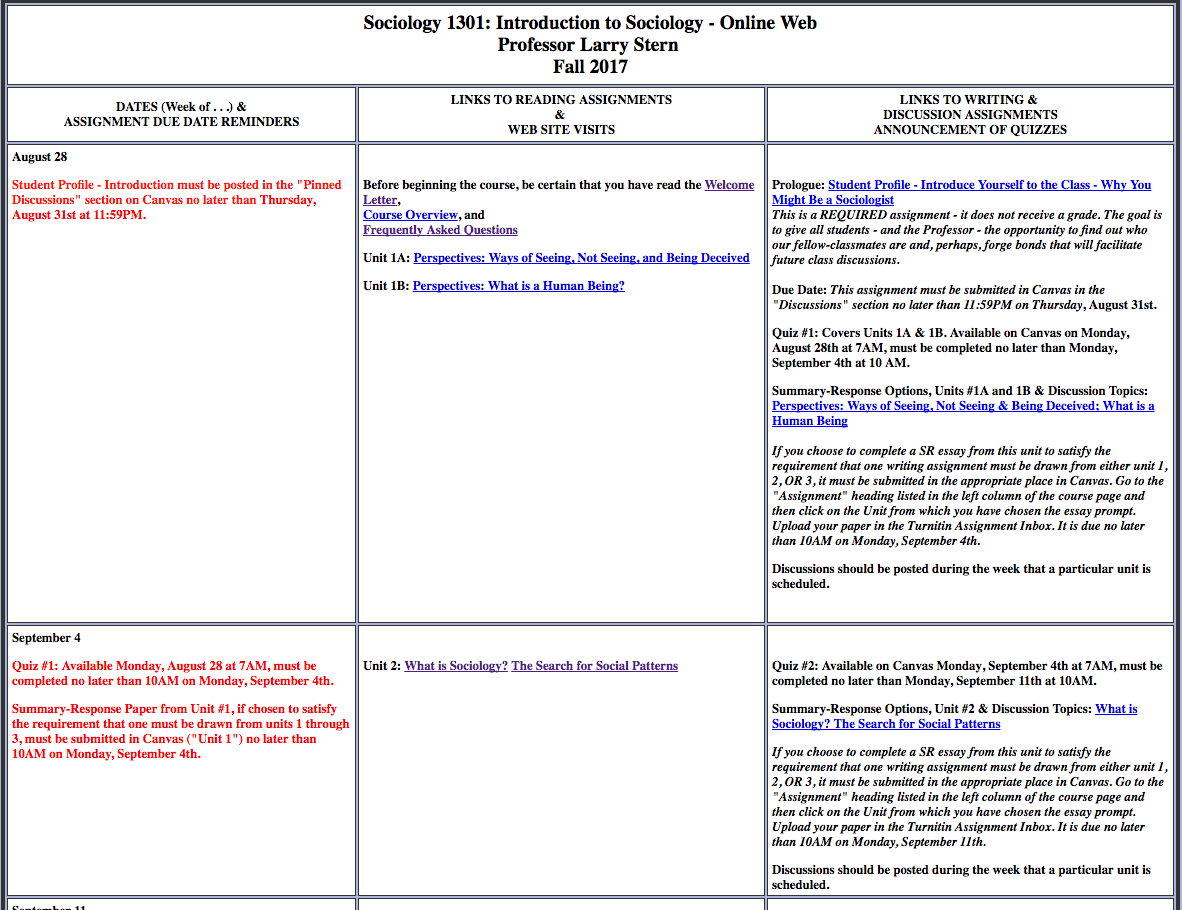
Left Column: Dates
This column indicates the date of the assignments (which will be found in the middle and right hand columns) AND, in red, reminders of particular assignments that are due that day. If you look, for example, at the first day, beginning June 4th, you will see a reminder that your Profile where you introduce yourself to your fellow students - which is required - is due on Tuesday June 5th. Looking at the following days you will see that deadlines for taking the first quiz and submitting the writing assignment for Unit 1 (and so on).
Middle Column: Readings, web page visits and videos to view.
Links to all of the required readings, web page visits and videos to view will be found in the middle column of the class calendar. Each link will take you to a page that lists the week's reading and viewing assignment. If, for example, you click on Unit 1A: "Perspectives: Ways of Seeing, Not Seeing and Being Deceived," you will be brought to this page:
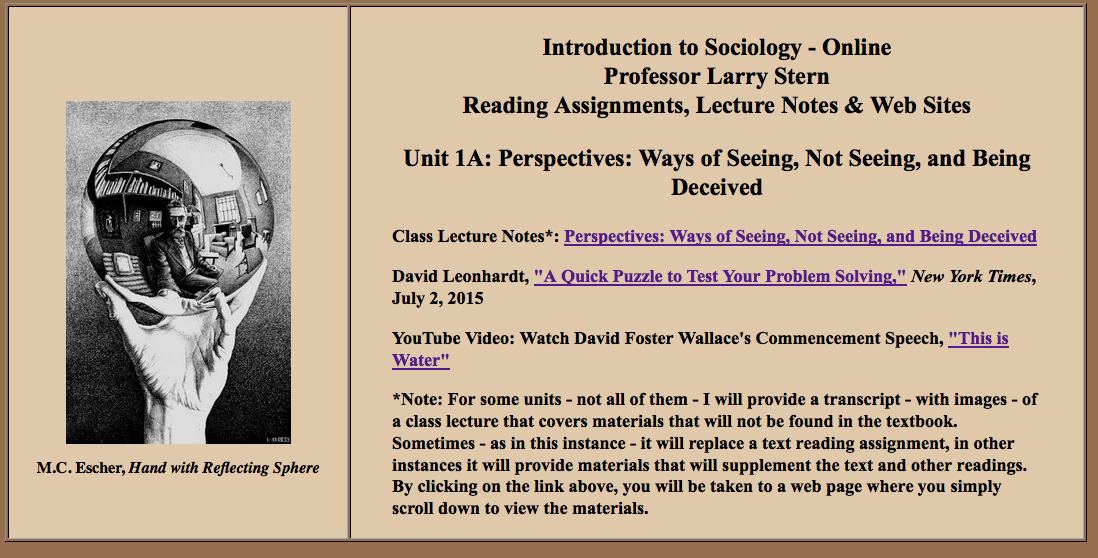
As you can see, active links are provided that will take you to the materials you will be asked to read - in this instance my lecture notes and an article from the New York Times - and to a video titled "This is Water." Although for this particular Unit there is no assigned reading from the textbook, you can expect to see those readings listed in later units. In those instances, you will simply see listed, among other readings with links, "Macionis, Society: The Basics, Chapter X." It might seem to you that there is an abundance of readings required for each unit. In most cases, the articles that I have asked you to read in addition to the chapters in the textbook are only a few pages long. In addition, these readings are designed to take about as much time to read and think about (roughly two-and-a-half hours each unit) as you would be spending in the classroom had you taken sociology as an on-site course.
Right Column: Links to Writing and Discussion Assignments (and Quiz reminders)
Links that will lead you to the prompts for the Summary-Response writing assignments along with a list of the Discussion Topics for each Unit will be found in the right hand column of the class calendar. Due dates for these assignments are also listed, as is a reminder that you get to choose which writing assignment you will submit - choosing only ONE from each batch/block of assignments. In addition, the activation date and time of the quiz for each unit, along with the deadline, is also listed in this column. For example, the right hand column for the week of September 4 - remember, this is an illustration from an older version of the course calendar - looks like this:
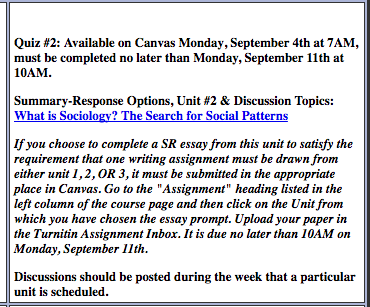
If, for example, you click on Summary-Response Options, Unit 2 & Discussion Topics: "What is Sociology? The Search for Social Patterns," you will be brought to a page that will (1) provide instructions, (2) privide the SR prompts, and (3) list the discussion topics.The SR prompt part will look something like this:
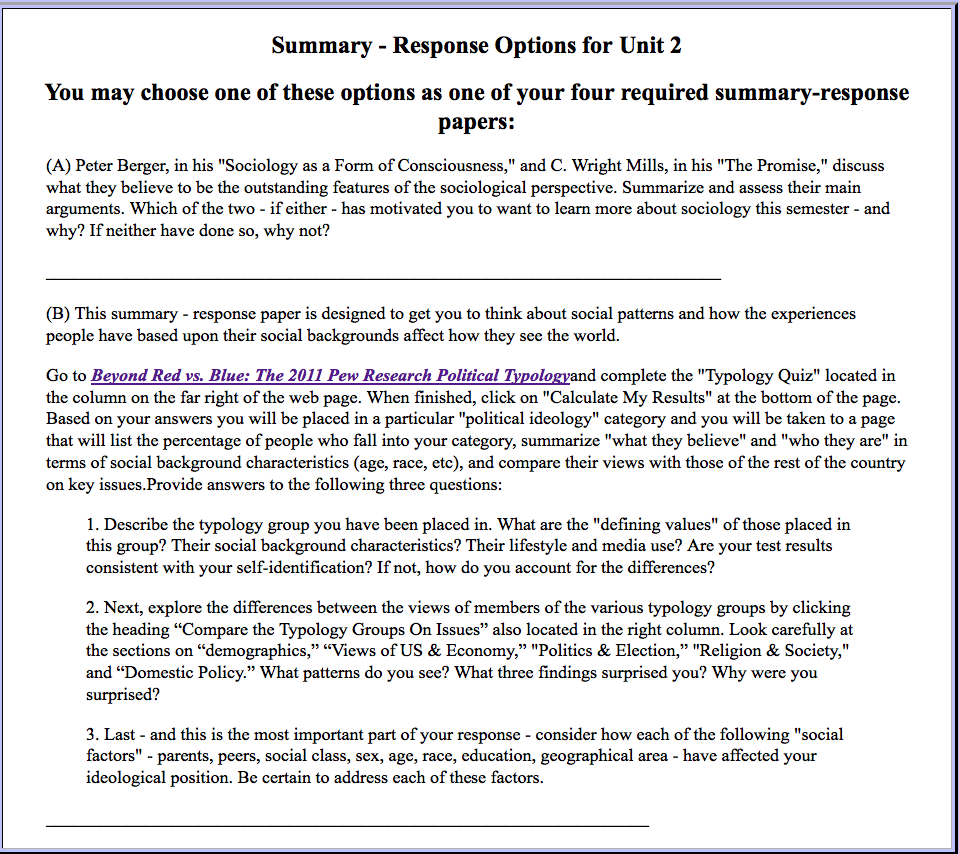
Contact Information
One of the more frequent criticisms of online classes – or shall I say, complaints from students about online courses – is that they are much too impersonal. We’re all hovering out there in cyberspace and don’t get to interact in a meaningful way with our fellow learners. This certainly could be the case – and you might in fact choose to be a lone learner – but it doesn’t have to be so. I will do all I can to encourage the interchange of ideas amongst you and I, in fact, prefer to actually see who I’m dealing with. So when you have questions for me – as you inevitably will if you are thoroughly engaged in the materials I present – and you are unable to come to campus to meet, lets talk on the phone or, perhaps, even chat on FaceTime – for a few minutes or for however long it takes to clarify whatever issues you’d like to explore. In my view, much more can be gained through the “give-and-take” of face-to-face interaction – where each participant can provide immediate feedback – then in exchanging emails. (This, in fact is one of the more frequent criticisms of online classes – or shall I say, complaints from instructors about online courses – that they are constantly writing emails, often taking more time to write an extended answer to student questions that it would take to “talk” about it!). So, if you choose to do so, all we will need to do is to set up a mutually convenient time to chat, perhaps in the evening (or wee hours of the night) if that is most convenient for you.
But - and please keep this in mind - I will of course answer all emails as well, and in a timely manner – typically on the same day (unless you email me at 11:45PM – then it will be the next day before I see it!). Remember: You must use Cougarmail. Do not use private email addresses.
Help
If this is the first course you are taking online, I suggest that you register for an orientation session offered by our eCollin Learning Center (eLC). You can also find various tutorials on the eLC site if you need help on how to post a comment on a discussion board, submit a writing assignment, or take an online quiz. If you have never used Blackboard, it might take you a while to get the hang of it. I think you will find the tutorials easy to follow and very helpful. I have also posted a "Frequently Asked Questions" page that might be fruitful for you to see.
An important thing to remember about online courses is that they are not self-paced. You must complete each week’s assignments and submit work by the specified due dates.
Bottom Line
So . . . what is expected of you? What are your obligations for this class? To think critically about what you will read, the web sites you will visit, the short videos you will watch, and the power point lectures that will ocasionally appear.
The noted philosopher and historian of science, Herbert Butterfield (1900 - 1979) perhaps expressed this best:

(Photo found at http://timetoeatthedogs.com/2008/07/10/read-my-editorial/)
"Of all the forms of mental activity the most difficult to induce, even in the minds of the young who may be presumed not to have lost their flexibility, is the art of handling the same bundle of data as before, but placing them in a new system of relations with one another by giving them a different framework, all of which virtually means putting on a different kind of thinking-cap for the moment."
I am looking forward to getting to know you over the next few weeks and helping you attain a deeper understanding of both yourself and the world you inhabit.
Keep smiling,
Larry Stern
Back to Course Home Page
